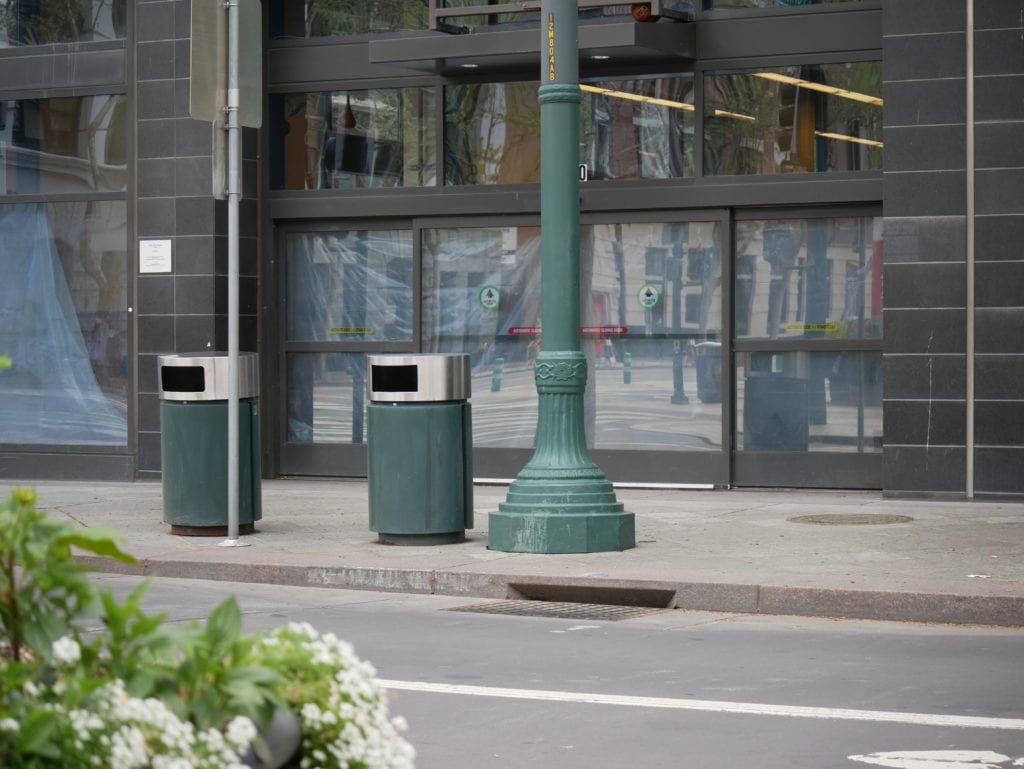San Jose has long had dozens of boarded-up businesses lining the main drags of the city’s downtown core, giving way to unsightly scenes of blight, drug use and crime.
As residents gripe about empty storefronts plaguing downtown’s streetscapes, Councilmember Raul Peralez, who represents downtown, has vowed to put an end to the drab storefronts by requiring landlords to register vacant downtown businesses and implementing a cost recovery fee on blighted properties.
According to recent city data, that program, which began in 2018, has registered 22 storefronts in the past 18 months. But those efforts have only made a slight dent in the problem, as more than 30 empty storefronts continue to line downtown streets.
“Unfortunately, it does not appear that the mandatory registration program is a significant catalyst in tenanting vacant storefronts as longtime vacancies in prominent buildings along Santa Clara Street, Second Street, and in the SoFA District persist,” said San Jose Downtown Manager Blage Zelalich and Code Enforcement Officer Rachel Roberts.
Still, Peralez said there’s been some progress, considering one of the biggest problems the city faces is absentee landlords who are difficult to track down.
In a phone interview, Zelalich said the city does not consider certain properties ”vacant” if they are actively being leased or in the process of being prepared for a new tenant.
For example, 2nd Story Bakery, located on East Santa Clara Street, is undergoing renovation to become “Holy Cannoli,” she said.
“Right now the paper is up on the wall still, so that building storefront would not be on our registry, but if you’re walking by you see it’s not an active storefront,” Zelalich said.

Peralez’s strategies of requiring a cost recovery fee and registering vacant businesses were first implemented in San Francisco, and proved to be successful.
San Francisco’s efforts to eliminate empty storefronts will be bolstered by this month’s voter approval of Proposition D. The ballot measure, which will go into effect in 2021, will tax vacant property owners $250 per linear foot of street frontage, if a retail space is vacant for at least six months.
Imposing a tax might be the punitive approach San Jose needs to crack down on absentee landlords, Peralez said. But, he added, many San Jose lawmakers don’t support such a tax since most of the city’s vacancies are downtown and the tax would need to go to the ballot for all city voters to decide.
“We don’t have the opportunity to impose that kind of fine just for being vacant unless it’s voter approved,” the councilmember said. “So the alternative that we did here in downtown was actually something that San Francisco had also done, as a start — a cost recovery fee.”
The fee is part of the city’s empty storefronts initiative adopted two years ago, which mandates landlords to pay $220 every three months for storefronts that have been empty for a month or more. The initiative also requires landlords to register their empty downtown commercial spaces. They must show proof that their property is being leased or sold to withdraw from the registry.
Eight storefronts have been removed from the registry since the program began, according to city officials. The average amount of time a storefront has stayed on the registry is 120 days.
San Jose is “years away” from obtaining the resources and education to make a push for a ballot initiative, Peralez said, especially at a time when the city is coping with the ongoing coronavirus outbreak and its housing and homelessness woes.
“It’s not necessarily something that just happens and passes easily — we need to see several years of our current code enforcement models not being successful,” Peralez added. “Who knows how much farther COVID-19 is going to take us. This was already a back-burner item that could delay even further and may not be something we talk about for several years.”
But filling vacant commercial spots is a persistent problem in other big cities as well.
Washington, D.C., in 2011 implemented a tax on vacant residential and commercial properties. San Francisco County Supervisor Aaron Peskin fought for years to get a vacancy tax on the ballot — securing unanimous support from leaders including Mayor London Breed, other members of the Board of Supervisors, U.S. Rep. Nancy Pelosi, state Sen. Scott Wiener and Assemblyman David Chiu.
Those endorsements were critical to winning two-thirds voter approval for the tax, said Lee Kepner, Peskin’s legislative aide who wrote the policy. The measure passed in San Francisco with 68.1 percent of the vote.
“It became — at least from an endorsement level — a consensus measure, which is important if you’re trying to get the two-thirds of the vote as we needed in this case,” Kepner said in a phone interview.
While high rents have forced many San Francisco stores and restaurants to close, similar to San Jose, wealthy landlords who don’t need the rent are also to blame, Kepner added. Many “bad actors” have kept commercial spaces vacant.
“They don’t need the tenant,” he said. “One of those assumptions is that they don’t need the downstairs tenant because they are making enough money off of an upstairs residential tenant.”
While Zelalich acknowledged the same problem is happening in San Jose, she said the city is focused on creating a more vibrant downtown to encourage landlords to lease their buildings and tenants to stay. Some of the strategies include pushing for more density, redesigning parts of downtown and cleaning up blight and trash.
Recently, San Jose has lost a slew of notable downtown businesses, including Safeway, Chromatic Coffee and Social Policy coffee shop.

“We’re looking at all of the different ways that we can create and enhance the sense of place in downtown through increased density and in commercial and residential development,” she said.
Zelalich added that she’s eager to hire an additional employee to help with downtown revitalization efforts — a retail development officer who starts later this month to form relationships with commercial brokers and property owners and be dedicated to retail development across the city.
”Having this one person that is solely focused on retail will give us more firepower to be able to focus on what’s really going on with these longtime vacancies,” she said.
Contact Nadia Lopez at [email protected] or follow @n_llopez on Twitter.



Leave a Reply
You must be logged in to post a comment.